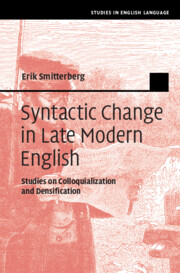Book contents
- Syntactic Change in Late Modern English
- Studies In English Language
- Syntactic Change in Late Modern English
- Copyright page
- Contents
- Figures
- Tables
- Acknowledgements
- Chapter 1 Introduction
- Chapter 2 Sociocultural and Linguistic Change in Late Modern English
- Chapter 3 Aspects of Language Change
- Chapter 4 Methodological Framework
- Chapter 5 Colloquialization I: Not-Contraction
- Chapter 6 Colloquialization II: Co-ordination by And
- Chapter 7 Densification I: Nouns as Premodifiers in Noun Phrases
- Chapter 8 Densification II: Participle Clauses as Postmodifiers in Noun Phrases
- Chapter 9 Concluding Discussion
- Appendix
- References
- Index
Chapter 8 - Densification II: Participle Clauses as Postmodifiers in Noun Phrases
Published online by Cambridge University Press: 19 November 2021
- Syntactic Change in Late Modern English
- Studies In English Language
- Syntactic Change in Late Modern English
- Copyright page
- Contents
- Figures
- Tables
- Acknowledgements
- Chapter 1 Introduction
- Chapter 2 Sociocultural and Linguistic Change in Late Modern English
- Chapter 3 Aspects of Language Change
- Chapter 4 Methodological Framework
- Chapter 5 Colloquialization I: Not-Contraction
- Chapter 6 Colloquialization II: Co-ordination by And
- Chapter 7 Densification I: Nouns as Premodifiers in Noun Phrases
- Chapter 8 Densification II: Participle Clauses as Postmodifiers in Noun Phrases
- Chapter 9 Concluding Discussion
- Appendix
- References
- Index
Summary
Participle clauses as postmodifiers in noun phrases (e.g. the window broken by the thief) have been discussed as a potential indication of densification, as they are shorter than their most obvious alternative, that is, finite relative clauses. A careful examination reveals that only a subset of tokens of participle and relative clauses can be considered equivalent and exchangeable, and to reflect this finding both variationist and text-linguistic analyses are carried out. There is some evidence of densification in newspaper language and, to some extent, scientific texts; history texts, in contrast, develop in the opposite direction, underscoring the importance of considering subgenres of academic writing. Among the newspapers considered, the Poor Man’s Guardian, which was aimed at working-class readers, shows no tendencies towards densification; this may be due to journalists’ perceptions about the paper’s readership. The issue of whether variationist or text-linguistic approaches are more suitable is discussed. Non-restrictive participle clauses are shown not to indicate densification; instead, they function as a characterizing or backgrounding device in narrative texts.
Keywords
- Type
- Chapter
- Information
- Syntactic Change in Late Modern EnglishStudies on Colloquialization and Densification, pp. 222 - 256Publisher: Cambridge University PressPrint publication year: 2021

